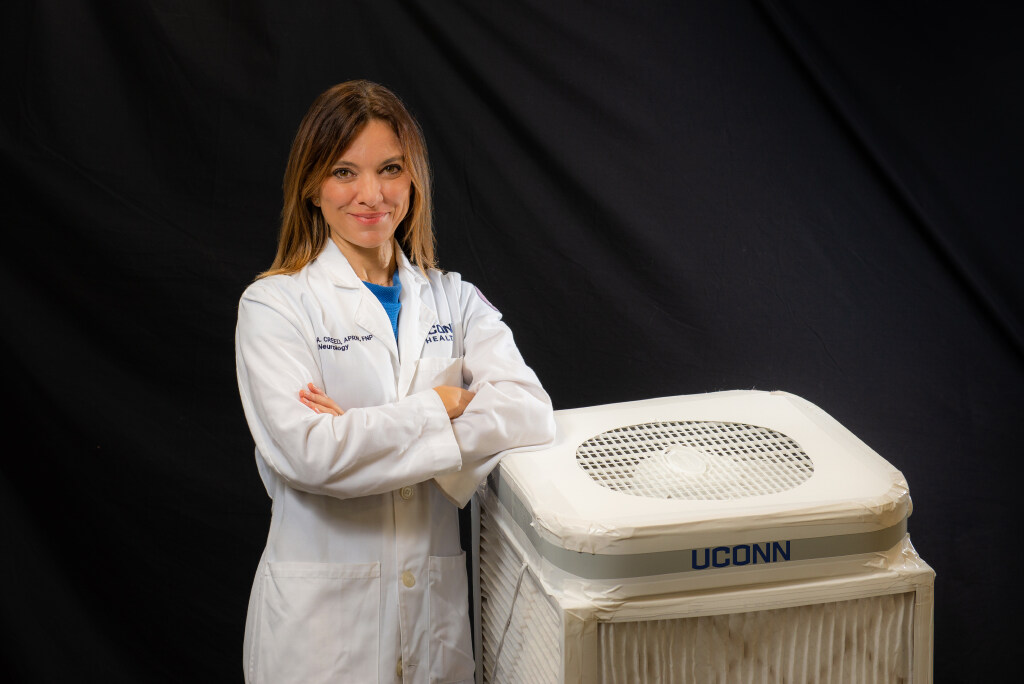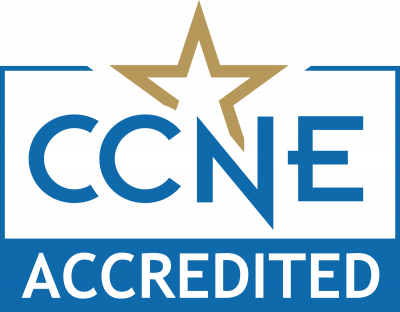
UConn Health nurse practitioner and director of the UConn Indoor Air Quality Initiative Marina Creed ’11 (NUR), ’17 MS, with a Corsi-Rosenthal Box.
Hand in Hand: New Nursing and Engineering Center Will Facilitate Better Health Care Technologies
The University of Connecticut’s Nursing and Engineering Innovation Center, one of the first of its kind in the nation, will advance health care, workforce, and economic development through interdisciplinary collaborations, positioning Connecticut to be a global leader in health care technology innovation.
The exciting concept for the Center became a reality this fall, after James Belmont ’86 (ENG) decided to support UConn through his estate planning and honor his parents for their dedication to his UConn education and that of his sister, Gail Belmont-Harwood ’81 (NUR). Belmont’s support for the Center’s Program Support Fund stems from the siblings’ understanding that best practices in innovation development indicate the need for end users to be involved in the design of new products. Registered professional nurses are the largest group of health care professionals today, totaling about 4 million, 10 times the number of physicians.
The Center formalizes the existing relationship between UConn’s nursing and engineering schools and provides a unique opportunity to promote the ideation, creation, and commercialization of new, evidence-based health care technologies that address unmet clinical needs, making health care safer and more effective, efficient, equitable, timely, and patient-centered.
“We are excited to see how it will enhance our research and educational programs, help meet the demand for our graduates in the workforce, and provide better care for patients,” says Tiffany Kelley, Ph.D., MBA, RN-BC, visiting professor and director of the School of Nursing’s Healthcare Innovation Online Graduate Certificate Program. “It is amazing what we can do with a little seed funding, enthusiasm, and determination.”
Kelley is co-directing the new center alongside Leila Daneshmandi, Ph.D., assistant professor-in-residence in innovation and entrepreneurship and director of the entrepreneurship Hub (eHub) in the College of Engineering. The mission of the new center — which encompasses research, education, community engagement, and technology transfer efforts — is to advance health care, workforce, and economic development through interdisciplinary collaborations between nursing and engineering that promote innovations in health technology.
“Engineers are trained to solve problems and create solutions. They have the technical knowledge, skills, and abilities to actualize new technologies,” Daneshmandi says. “By partnering with nurses and health care professionals, who have deep contextual knowledge of on-site problems and needs, we can ensure that our innovations are user-centric and designed for unmet health care needs.”
The new School of Nursing building (see story on page 4) will further support the mission of the center, says Dean Victoria Vaughan Dickson, “as a nursing innovation headquarters with dedicated space and resources to facilitate teamwork, critical thinking, and creativity among the nursing and engineering students and faculty.” In its initial phase, the center includes the creation of joint educational programs for students and seed grants for collaborative research among faculty.
The deans of the two schools, who will oversee the innovation center throughout its development with assistance from an advisory board, expect this first phase to take two to three years. The goal of the second phase is to create a shared state-of-the-art research and teaching facility, which will require major University, state, federal, or donor investment.
“We are joining forces not only to support our research activities, but also to expand student learning and have a greater impact on patients and employers across Connecticut,” says former School of Nursing Dean Deborah Chyun. Not only could prototypes be field-tested and exhibited in such a facility, but it would also further integrate established undergraduate- and graduate-level programs at the two schools, helping to meet the increasing demand for workers in both fields.
“The College of Engineering has strong connections in health care, especially through our Biomedical Engineering Department operated with UConn Health,” says College of Engineering Dean Kazem Kazerounian. “With this new innovation center, however, we’re investing in patient focused care at the hands of the talented nurse workforce.”
The Nursing and Engineering Innovation Center is not the first instance of collaboration between the two schools. Researchers affiliated with the School of Nursing’s Center for Advancement in Managing Pain belong to both schools and are actively involved in shared training and research activities. Several interdisciplinary teams have also submitted grant applications for collaborative projects.
Among other collaborations, School of Nursing associate professor Ruth Lucas worked with engineering faculty to design her breastfeeding diagnostic device, which measures infants’ sucking during breastfeeding. The project involved intellectual property disclosures and patent applications, garnered a UConn Spark grant award, was a Johnson & Johnson Quick Fire Nurse-Led Innovation Finalist, and provided a roadmap for subsequent federal grant applications.
Ellen Quintana ’21 (NUR) worked with engineering students to design the now-patented ReduSeal glove waste reduction system. And in the spring of 2022, students at both schools built hundreds of Corsi-Rosenthal Boxes, which are do-it-yourself air purifiers that aid in filtration to reduce transmission of COVID-19.
“The Nursing and Engineering Innovation Center is a natural progression of collaborations that have been ongoing for the last several years,” says Kelley.
In addition to developing health care technology innovations, the center will deliver interdisciplinary didactic and experiential educational opportunities, engage community partners from clinical and community settings, and proactively position nursing and engineering students and faculty to support commercialization of new health care technologies within an academic institution. The organizers are excited about the myriad possibilities available to build partnerships between existing programs in both schools, such as tapping into offerings from the School of Nursing’s Healthcare Innovation Graduate Certificate program and the College of Engineering’s technology entrepreneurship minor to develop new offerings for nursing and engineering students.
In addition to support from Belmont and Belmont Harwood, the Nursing and Engineering Innovation Center received supportive funds from both schools, the Provost’s Office, the Office of the Vice President of Research, and a $30,000 VentureWell Courses and Programs grant to support collaborative nursing and engineering undergraduate education advancement in this area. The VentureWell grant was awarded to fund a fellowship program for students from both schools to come together and work on health care technological solutions.
Visit nursing-engineering-innovation.center.uconn.edu to learn more.
This article was originally published in the Fall 2023 issue of Unison.pdf.
